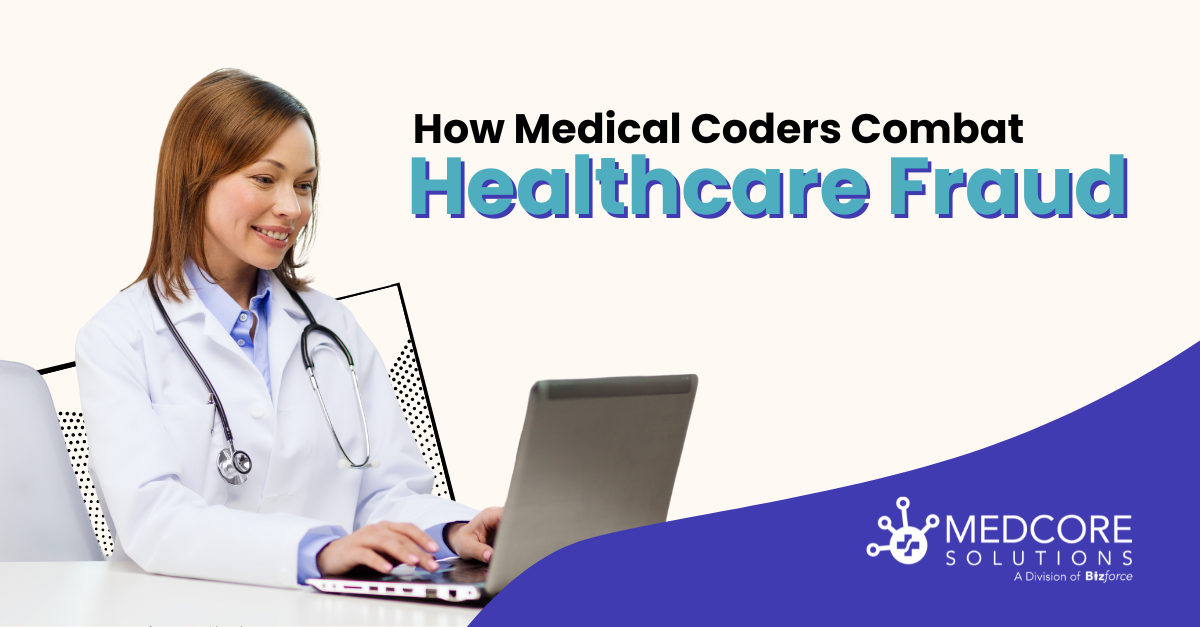Healthcare fraud is an issue that undermines the integrity of healthcare systems worldwide, costing billions of dollars annually. In fact, according to the NHCAA, scams designed to burden individuals and insurance companies with fraudulent and illegal medical charges result in over $54 billion in losses annually. While many are familiar with the roles of physicians, nurses, and administrative staff, the critical contributions of medical coders in the fight against healthcare fraud often go unrecognized.
Therefore, medical coders, with their expertise in medical terms, coding systems, and compliance regulations, play an essential role in detecting and preventing fraudulent activities. This blog delves into the multifaceted role of medical coders and how they help combat healthcare fraud.
Understanding Healthcare Fraud

Healthcare fraud involves deception or misrepresentation with the intent to receive unauthorized benefits. Common forms of healthcare fraud include:
- Billing for Services Not Rendered: Submitting claims for services, procedures, or equipment that were never provided.
- Upcoding: Billing for more expensive services or procedures than those actually performed.
- Unbundling: Separately billing for procedures that should be covered under a single comprehensive code.
- Kickbacks: Offering or accepting payments in exchange for patient referrals or services.
- Phantom Billing: Charging for non-existent medical services or supplies.
These fraudulent practices not only lead to financial losses but also compromise patient care and trust in the healthcare system.
MedCore’s remote medical coders are instrumental in preventing healthcare fraud, safeguarding patient care, and maintaining trust in the healthcare system by ensuring accurate and compliant medical billing. Our expert coders help prevent fraudulent practices, protecting both financial resources and patient well-being.
The Role of Medical Coders in Combating Healthcare Fraud

Medical coders are tasked with translating medical documentation into standardized codes used for billing and record-keeping. Moreover, their work ensures that healthcare providers receive appropriate refund for services rendered. Here’s how medical coders help fight healthcare fraud:
-
Ensuring Accurate and Honest Documentation
Medical coders carefully review clinical documentation to ensure that it accurately reflects the services provided. Furthermore, they verify that all claims submitted are based on legitimate medical records. This attention to detail helps prevent fraudulent claims from being processed and reimbursed.
For example, a coder might identify discrepancies in patient records where the documented services do not match the billed services, flagging these inconsistencies for further investigation.
-
Identifying and Reporting Upcoding and Unbundling
Upcoding and unbundling are common healthcare fraud practices. Coders are trained to recognize when a provider attempts to bill for a more expensive procedure than what was performed or when procedures that should be bundled together are billed separately. Therefore, by identifying these practices, coders can prevent overpayments and potential legal issues.
For instance, a medical coder might notice that a routine check-up has been coded as a more complex and costly procedure, prompting a review of the claim.
-
Ensuring Compliance with Regulatory Standards
Furthermore, medical coders stay updated on the latest coding guidelines and regulatory changes. Their expertise ensures that billing practices comply with laws such as the Health Insurance Portability and Accountability Act (HIPAA) and the False Claims Act. This compliance helps safeguard against healthcare fraud activities and reduces the risk of audits and penalties.
For example, coders might ensure that all claims are HIPAA-compliant, protecting patient information and maintaining the integrity of the billing process.
-
Using Technology to Detect Fraud

Additionally, advanced coding software and data analytics tools help medical coders identify unusual patterns and anomalies in billing data. These technologies can flag suspicious claims for further review. Consequently, this helps in the early detection of fraudulent activities.
For instance, automated systems might alert coders to a sudden increase in high-cost procedures for a specific provider, indicating potential healthcare fraud.
-
Education and Training
Medical coders play a crucial role in educating healthcare providers and administrative staff about proper coding practices and the implications of healthcare fraud. Through training programs and continuous education, coders help create a culture of compliance and awareness within healthcare organizations.
Additionally, coders can conduct workshops to train physicians on accurate documentation practices. This reduces the risk of unintentional coding errors that could be perceived as healthcare fraud.
Challenges Faced by Medical Coders
Despite their critical role, medical coders face several challenges in combating healthcare fraud:
- Complex and Evolving Regulations: Keeping up with constantly changing coding guidelines and regulatory requirements can be demanding.
- High Workloads: Moreover, the sheer volume of claims to be processed can lead to errors and oversight if coders are overburdened.
- Limited Resources: Smaller healthcare facilities might lack the advanced technological tools that larger institutions use to detect healthcare fraud.
- Resistance to Change: Lastly, implementing new compliance measures and educating staff can encounter resistance, especially in established practices.
Enhancing the Role of Medical Coders in Healthcare Fraud Prevention
To further empower medical coders in the fight against healthcare fraud, healthcare organizations can take several steps:
- Invest in Training and Education: Regular training programs to keep coders updated on the latest regulations and coding practices are essential.
- Implement Advanced Technology: Utilize sophisticated coding software and data analytics tools to aid in healthcare fraud detection and prevention.
- Promote a Culture of Compliance: Encourage a workplace culture that values compliance and ethical behavior, making it easier for coders to perform their roles effectively.
- Provide Adequate Support: Ensure that medical coders have manageable workloads and the necessary resources to perform their duties accurately.
Conclusion
Medical coders are unsung heroes in the battle against healthcare fraud. Their careful attention to detail, extensive knowledge of coding systems, and commitment to compliance play a pivotal role in ensuring the integrity of healthcare billing and reimbursement processes. Consequently, by recognizing and supporting the essential work of medical coders, healthcare organizations can significantly reduce the incidence of fraud, protect patient trust, and maintain the financial health of the healthcare system. As the landscape of healthcare continues to evolve, the role of medical coders will remain vital. They safeguard against fraudulent activities and promote a transparent and accountable healthcare environment.
Ready to enhance your team with top-tier expertise and protect your practice from healthcare fraud? Contact MedCore today to integrate our highly skilled remote medical coders into your team. Ensure accuracy, compliance, and trust in your medical billing processes. Reach out to us here.

